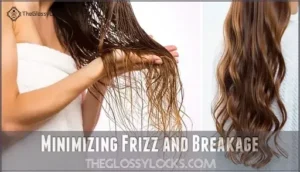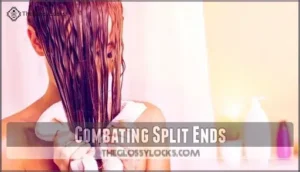This site is supported by our readers. We may earn a commission, at no cost to you, if you purchase through links.

The warm, moist fibers create an ideal breeding ground for pathogens like Klebsiella pneumoniae and Pseudomonas, not to mention mold species that thrive in humidity. Using the same hair towel for a week isn’t just a hygiene gamble—it’s transferring yesterday’s microbes directly onto your clean hair and scalp, potentially triggering folliculitis, breakouts along your hairline, and even hair damage.
Understanding the hidden risks lurking in your towel routine and knowing exactly when to toss it in the wash can protect both your hair health and your skin.
Table Of Contents
- Key Takeaways
- Is It Okay to Use The Same Hair Towel for a Week?
- Why is Hair Towel Hygiene Important?
- How Often Should You Wash Hair Towels?
- What Happens if You Don’t Wash Hair Towels?
- How Does Towel Material Affect Hair Health?
- How Do You Properly Wash Hair Towels?
- Can You Use The Same Towel for Face and Hair?
- Tips for Towel Drying Hair Without Damage
- How to Safely Reuse Towels Between Washes
- Top Microfiber Hair Towels to Try
- Frequently Asked Questions (FAQs)
- What are the risks of using the same hair towel for multiple days?
- How often should I replace my hair towel?
- Are there any special instructions for washing microfiber hair towels?
- What temperature water kills bacteria on towels?
- How long does bacteria survive on damp towels?
- Can sharing hair towels spread infections between people?
- Should you wash new hair towels before use?
- How do you remove musty smell from towels?
- Conclusion
Key Takeaways
- Reusing the same hair towel for a week creates a breeding ground for up to 890 million colony-forming units of bacteria, along with pathogens like Klebsiella pneumoniae, Pseudomonas, and mold species that can trigger scalp infections, folliculitis, breakouts, and hair damage.
- Dermatologists recommend washing hair towels every 3-4 uses under normal conditions, but daily changes are necessary for people with oily hair or acne-prone skin, and after every use during illness or post-gym sessions to prevent bacterial transfer.
- Microfiber towels outperform cotton and terrycloth by absorbing up to seven times their weight in water, reducing drying time by 40%, and minimizing friction-related damage like breakage and frizz through their smooth, flat-weave construction.
- Proper towel hygiene requires washing in warm water (104-140°F) without fabric softener, followed by complete air-drying on racks or hooks in ventilated spaces to prevent moisture accumulation that fuels microbial growth between uses.
Is It Okay to Use The Same Hair Towel for a Week?
No, using the same hair towel for a week isn’t ideal—but the real answer depends on how you’re using it and storing it. Bacterial buildup, moisture retention, and what’s already on your hair all play a role in whether you’re courting trouble or just cutting laundry corners.
Let’s break down the risks, what actually matters for towel hygiene, and what dermatologists recommend.
Risks of Reusing Hair Towels
Frankly, reusing your hair towel for a week invites trouble. Bacteria and fungi multiply fast on damp fibers—studies show up to 93% of towels harbor viable microorganisms even after laundering.
You’re risking scalp infections from Klebsiella pneumoniae and Pseudomonas, plus mold species like Aspergillus that thrive in moisture. This microbe spread can trigger hair damage, breakouts, and fungal development.
Following towel hygiene tips and focusing on bacterial growth prevention protects your scalp and hair from unnecessary harm. Regularly checking for towel hygiene is essential to maintain a healthy scalp and hair.
Factors Affecting Towel Hygiene
Not every towel faces the same odds—how often you shower, your hair type, your bathroom’s humidity, and whether you’re the only one using that towel all shift the hygiene equation. Here’s what accelerates microbe growth:
- Towel fabric matters—dense terry cloth traps moisture longer than microfiber towel benefits offer through quick-dry weaves
- Drying methods determine bacterial transfer—bunched towels stay damp, fueling bacterial growth
- Multiple users compound towel washing frequency needs through repeated contamination
- High humidity environments demand stricter towel sanitizing and towel care and maintenance protocols
Expert Recommendations
So what do dermatologists actually say? Experts recommend washing your hair towel every 3–4 uses to keep microbe prevention on track and meet hygiene standards. If you’re acne-prone, daily changes help prevent bacterial growth from triggering breakouts. In humid climates, wash even more frequently—moisture accelerates contamination.
For proper towel sanitizing, use hot water (60°C/140°F minimum) and hang your microfiber towel to air-dry completely. Following these dermatologist advice guidelines protects your hair health while maintaining strong towel hygiene practices. Regularly checking towel hygiene tips can also provide valuable insights into maintaining cleanliness.
Why is Hair Towel Hygiene Important?
Your hair towel isn’t just about drying—it’s a hotspot for bacteria, mold, and odor if you’re not careful. These issues don’t stay trapped in the fabric; they transfer directly to your scalp and skin, creating real risks you can’t ignore.
Let’s break down why towel hygiene matters more than you might think.
Bacterial Growth and Microbial Risks
When you use a hair towel repeatedly, bacterial growth accelerates at a startling pace. After just one week of daily use, towel bacterial load can reach up to 890 million colony-forming units.
After just one week of daily use, your hair towel can harbor up to 890 million colony-forming units of bacteria
Moisture retention and warmth create ideal conditions for microbial growth factors like biofilm persistence, where protective layers shield microorganisms from cleaning agents.
Pathogen transmission becomes a real concern as bacteria, including Staphylococcus, colonize the fibers, potentially causing scalp/skin impacts through bacterial control failure, and preventing germ growth becomes nearly impossible.
Odor and Mold Development
Within days of repeated use, that unpleasant musty smell isn’t just embarrassing—it’s a warning sign that mold spores have begun colonizing your damp towel. Fungal growth thrives in moisture, turning your microfiber towel into a breeding ground for microorganisms.
Without proper towel drying and odor control, bacterial spread accelerates alongside mold prevention failure. You’re basically rubbing yesterday’s germ growth back into your clean hair, undermining bacterial control and microbe management entirely.
Impact on Scalp and Skin Health
When dirty towels meet vulnerable scalp tissue, you’re inviting a cascade of dermatological problems that range from annoying flare-ups to persistent infections requiring medical intervention. Bacterial transfer from contaminated fabric directly triggers scalp infections, folliculitis, and acne breakouts along your hairline.
Poor hygiene compromises both scalp health and skin health, while accumulated bacteria accelerate hair damage through inflammatory responses that weaken follicles and disrupt your overall hair health.
How Often Should You Wash Hair Towels?
You don’t need to wash your hair towel after every single use, but you shouldn’t push it to a full week either. The right frequency depends on how you use it, who’s using it, and whether you’re dealing with any special circumstances.
Let’s break down the specific guidelines so you can find the washing schedule that works for your situation.
Recommended Washing Frequency
Your washing schedules matter more than you might think. Dermatologists recommend washing hair towels every three uses to keep bacterial control effective and prevent scalp irritation. If you deal with oily hair, bump that up to every one or two days—studies show daily towel changes reduce scalp sebum by 30%.
Laundry frequency should increase when towels stay damp between uses, since moisture accelerates microbial growth and compromises your towel hygiene practices.
Guidelines for Multiple Users
Sharing towels between family members multiplies bacterial transfer by up to 400%, turning a simple hygiene habit into a microbial exchange program you didn’t sign up for. Shared living demands stricter hygiene protocols to protect everyone’s hair health:
- Assign color-coded towels for each person to prevent cross-contamination
- Wash after every use when family usage exceeds two people
- Keep guest towels separate with daily rotation systems
- Implement personal hygiene practices that prioritize infection prevention over convenience
Special Considerations (Illness, Gym Use)
Illness and intense workouts don’t just test your body—they accelerate the timeline for when your hair towel becomes a biohazard. When you’re sick, your compromised immunity makes daily towel washing non-negotiable for proper sick towel management.
Athletes carrying gym towel care risks—think athlete’s foot or staph—need immediate laundering after every sweat session to prevent bacterial growth from spreading to your scalp and triggering skin conditions that sabotage hair health.
What Happens if You Don’t Wash Hair Towels?
Skipping towel wash day isn’t just a hygiene hiccup—it’s an invitation for trouble. When you leave a damp towel hanging around for days, you’re basically rolling out the red carpet for bacteria, mold, and all sorts of unwelcome guests.
Here’s what actually happens when you let that hair towel go unwashed.
Scalp Infections and Skin Irritations
You wouldn’t think a towel could wreak such havoc—but bacterial growth and fungal infections thrive on damp, dirty fabrics. Tinea capitis affects up to 15% of kids in some populations, often spread through contaminated towels.
Your sensitive scalp can develop folliculitis, redness, or intense itching. Skin irritation worsens with allergens trapped in fibers, triggering allergic reactions.
Personal hygiene matters: proper towel care prevents skin infections and acne aggravation before they start.
Acne and Breakouts
Your towel might already be triggering breakouts without you realizing it—oil, dead skin cells, and bacteria accumulate with each use, creating a breeding ground for acne-causing microbes.
Towel cross-contamination transfers these acne triggers directly to your face and hairline. Here’s what happens:
- Skin bacteria multiply rapidly in damp environments
- Product residue mixes with oils, clogging pores
- Repeated exposure worsens existing skin conditions
- Breakout prevention requires fresh, clean towels
Personal hygiene isn’t optional—your towel matters.
Hair Damage and Hair Loss
Beyond breakouts, that same grimy towel can physically damage your hair shaft and even contribute to hair loss. Bacteria buildup weakens hair follicles, while product residue creates friction that causes hair breakage, frizz control issues, and split ends.
Your scalp health suffers too—inflammation disrupts your hair care routine‘s effectiveness. Switching to a clean microfiber hair towel protects against hair damage while supporting stronger growth.
How Does Towel Material Affect Hair Health?
Not all towels treat your hair the same way. The material you choose makes a real difference in how much damage, frizz, and breakage you’re dealing with.
Let’s break down what each type does to your strands and why it matters.
Microfiber Vs. Cotton Towels
When comparing towel material options, absorbency comparison reveals that microfiber hair towels absorb up to seven times their weight in water—far outpacing cotton towels. Friction effects matter more than you’d think: microfiber’s smoother surface minimizes hair breakage and frizz, while cotton’s coarser fibers can disrupt cuticles.
Hygiene differences favor microfiber too, since faster drying limits bacterial growth.
Durability factors vary—microfiber resists lint but may decline after 20 washes, while cotton offers longevity.
Environmental impact? Cotton’s biodegradable but water-intensive; microfiber risks microplastic pollution.
Terrycloth and Hair Damage
Terry cloth’s looped fibers might feel plush on your body, but those same rough textures act like velcro on wet hair—snagging strands, lifting cuticles, and creating the perfect recipe for frizz and breakage.
That fabric friction amplifies cotton damage when you’re vigorously rubbing or twisting your hair dry.
If frizz control matters to you, ditch the terry cloth hair towel and rethink your hair drying techniques entirely.
Benefits of Using Microfiber Hair Towels
Microfiber hair towels pack 200,000 ultra-fine fibers per square inch—a breakthrough that slashes drying time by 40% while protecting your strands from the friction damage that cotton can’t avoid.
Their flat weave won’t snag hair cuticles, delivering smoother results with frizz reduction and damage prevention you can actually see. You’ll notice easier combing and fewer split ends, making these microfiber hair towels the smarter choice for gentle material that prioritizes absorbency power without sacrificing your hair’s integrity.
How Do You Properly Wash Hair Towels?
Washing your hair towels the right way keeps bacteria at bay and extends their lifespan. The process involves more than just tossing them in with your regular laundry—you’ll need to pay attention to water temperature, detergent choice, and how you dry them afterward.
Here’s what you need to know to keep your towels fresh and hygienic.
Washing Techniques for Hygiene
Washing your hair towel the right way isn’t rocket science, but a few simple techniques make all the difference between truly clean and just rinsed off. Start by shaking out hair strands and debris before tossing your microfiber towel into the machine.
Keep sanitizing methods simple—regular laundry detergent on a gentle washing cycle does the job without degrading fabric fibers. Skip fabric softener, which coats microfiber and kills its absorbency, defeating your hygiene routines and towel care efforts entirely.
Best Water Temperature and Detergents
What’s the magic number regarding water temperature—hot enough to kill bacteria but gentle enough to keep your towel intact? Aim for warm water—around 104-140°F—which balances hygiene with fabric care during washing cycles.
- Detergent types: Choose gentle cleansers without harsh chemicals that strip microfiber integrity.
- Washing machine settings: Select a delicate cycle to preserve towel fibers while achieving proper sanitation.
- Fabric softener rule: Always skip it—coating fibers compromises absorbency and undermines your towel care efforts.
Drying and Storage Tips
Once your towel’s clean, how you dry and store it determines whether you’re setting yourself up for freshness—or a microbial comeback tour. Air-dry your microfiber hair towel on drying racks instead of bunching it in storage bins—proper towel drying prevents moisture accumulation where bacteria thrive. Skip towel folding until completely dry.
Prioritize ventilated spaces for towel maintenance between hair wrapping sessions, ensuring your microfiber care routine aids effective drying techniques and extends towel washing intervals.
Can You Use The Same Towel for Face and Hair?
You might be tempted to grab whatever towel is handy after washing your face and hair, but that convenience comes with some real downsides. Your face has different needs than your scalp, and mixing towels can transfer bacteria, oils, and product residue where you don’t want them.
Let’s break down why keeping these towels separate matters for your skin and hair health.
Cross-Contamination Risks
When you use the same towel to dry your face and hair, you’re basically playing a game of germ roulette—transferring bacteria, oils, and residue from one area to another. Your scalp produces sebum and traps environmental debris, while your face collects makeup, skincare products, and its own oil.
Cross-contamination happens when these microbes migrate between surfaces, potentially triggering breakouts or skin irritation. A dirty towel becomes a vector for bacterial transfer and germ spread.
Best Practices for Towel Separation
The simplest fix for cross-contamination is treating your towels like a specialized toolkit—one job per tool, no exceptions. Proper towel assignment and separate storage prevent bacteria and towel usage problems that compromise skin health and towels’ cleanliness.
- Color coding simplifies towel rotation at a glance
- Designated hooks maintain face and body towel separation
- Weekly laundry scheduling matches towel washing frequency to hygiene needs
- Following towel replacement guidelines guarantees materials stay effective
This system eliminates guesswork and protects your skin from unnecessary microbial exposure.
Preventing Skin Issues
Your daily towel habits directly determine whether you’re protecting your skin or feeding problems you can’t yet see. Bacteria transfer happens fast—each face-towel contact risks skin infections and acne flare-ups.
Maintain scalp health and skin conditions under control through gentle cleansing routines, regular towel sanitizing, and removing hair product residue before it migrates. Clean towels are foundational skin care tips that prevent hygiene breakdowns affecting your skin health.
Tips for Towel Drying Hair Without Damage
The way you dry your hair matters just as much as keeping your towel clean. Poor drying habits can undo all your hygiene efforts by causing mechanical damage to wet, vulnerable strands.
Let’s break down the techniques that protect your hair while it dries.
Proper Drying Techniques
How you manage those first few seconds after showering can make or break your hair’s health—and most people unknowingly set themselves up for damage before they’ve even reached for a brush. Instead of rubbing your hair vigorously, try scrunching gently with a microfiber hair towel to absorb excess water without causing hair breakage.
Plopping methods work well for curly textures, while air drying after product application reduces heat damage and shortens drying time considerably.
Minimizing Frizz and Breakage
Frizz doesn’t just happen by accident—it’s often the direct result of friction between wet hair strands and whatever fabric you’re using to dry them. Microfiber hair towels provide breakage prevention through their smooth, flat weave that won’t snag delicate strands.
This gentle drying approach delivers frizz control and hair smoothing while the ultra-absorbent fabric manages hair drying efficiently, minimizing hair damage prevention concerns that come with rough terrycloth alternatives.
Combating Split Ends
Split ends aren’t reversible once they form, but switching to a microfiber towel can stop new damage before it starts. The flat weave protects your cuticle during that vulnerable wet stage when hair breakage peaks.
Here’s your split end prevention strategy:
- Pat gently instead of rubbing—aggressive motion literally tears strands apart
- Squeeze excess water with the towel rather than twisting or wringing
- Replace worn towels every 6-12 months as fibers degrade
This damage control approach fosters long-term hair repair and frizz reduction while maintaining hair health.
How to Safely Reuse Towels Between Washes
Look, you don’t have to toss your towel in the wash after every single use—but you do need a system to keep things clean between laundry days. Proper air drying makes all the difference in stopping bacteria from throwing a party on your towel.
Here’s how to stretch that towel life without sacrificing your scalp health.
Air Drying and Hanging Methods
After each use, spreading your towel flat or hanging it properly isn’t just good manners—it’s your frontline defense against turning a clean towel into a bacterial breeding ground. Proper hanging on drying racks allows maximum air circulation, speeding up air dry time and starving bacteria of the moisture they need.
Sunlight exposure adds natural disinfection, while space-saving hooks work if they allow your hair towel to spread out completely, promoting faster hair drying time reduction and better hygiene for your hair health.
Preventing Germ and Mold Growth
Between washes, keeping germs and mold at bay depends almost entirely on one thing: how quickly you eliminate moisture from the fabric. Damp environments fuel bacteria growth and compromise infection prevention efforts.
Spread your towel in direct sunlight whenever possible—UV rays provide natural microbial control. Avoid bunching or layering wet towels, which traps moisture and accelerates mold development.
These simple hygiene practices dramatically improve bacterial reduction and maintain cleanliness between proper wash cycles.
When to Replace Towels
Even with perfect drying habits, every towel eventually reaches a point where washing can’t restore its hygiene. Watch for persistent musty odors, rough texture, or visible discoloration—these signal compromised fabric durability and failing hygiene standards.
Most hair towels hit their shelf life around six months to a year, depending on laundry frequency and maintenance schedules. Replace them promptly to protect your hair and scalp health.
Top Microfiber Hair Towels to Try
If you’re ready to upgrade your hair care routine, the right microfiber towel makes all the difference. Not all towels are created equal, and choosing one designed specifically for hair can protect against damage while speeding up drying time.
Here are three solid options worth considering.
Aquis Microfiber Hair Drying Towel
Aquis microfiber towels pack 200,000 ultra-fine fibers per square inch—turning your post-shower routine into a fast-track to smoother, healthier hair. Here’s what makes this hair turban a standout:
- Cuts drying time by 40%, so you’re not waiting around with a soggy head
- Flat weave protects your cuticle, preventing the roughness that leads to breakage
- Lasts for years with proper care—real towel durability that pays off
- Wraps securely for hands-free styling while you get ready
The fabric softness and gentle drying action minimize frizz from root to tip.
Ultra Absorbent Hair Drying Wrap
If you’ve ever wrapped your hair and forgotten about your towel until laundry day, you’re risking more than just a funky smell—bacteria thrive in damp fabric, and your scalp pays the price. An ultra-absorbent hair-drying wrap made from microfiber delivers serious towel absorbency while protecting your hair care routine from damage.
Smart drying techniques start with choosing towels that soak up moisture without the snag factor—your hair deserves better than rough terrycloth.
| Feature | Microfiber Benefits | Hair Wrap Tips |
|---|---|---|
| Drying Speed | Cuts time by ~40% | Secure elastic edge keeps wrap in place |
| Hair Protection | Gentle, flat weave prevents breakage | Avoid friction and roughing up cuticles |
| Maintenance | Wash after 2-3 uses to prevent buildup | Hang to dry between uses for freshness |
Choosing The Right Hair Towel for You
Not all hair towels are created equal—picking the wrong one is like using sandpaper when you need silk. Match your towel material to your hair’s needs, and you’ll protect your strands while cutting down on damage.
Consider these factors when shopping for your microfiber hair towel:
- Towel fabric and material quality: Look for high-density microfiber with 200,000+ fibers per square inch for exceptional absorbency level
- Hair types matter: Fine hair needs lightweight wraps; thick, curly hair requires larger towels with extra absorption
- Towel size: Measure your hair length—short styles work with compact wraps, while long locks need full-coverage options
- Microfiber benefits: Flat weave prevents snagging and reduces drying time by 40% compared to cotton
- Hair care compatibility: Choose towels that complement your routine without harsh chemicals or rough textures
Frequently Asked Questions (FAQs)
What are the risks of using the same hair towel for multiple days?
Think of damp towels as cozy little incubators for trouble. Reusing the same hair towel breeds bacteria, causes scalp infections, triggers breakouts, and damages hair through microbe growth and bacterial buildup, compromising hygiene and odor control in your hair care routine.
How often should I replace my hair towel?
Replace your hair towel every year or two, depending on wear and tear.
Watch for signs like thinning fabric, persistent odors even after washing, reduced absorbency, or fraying edges—these signal it’s time for a fresh one.
Are there any special instructions for washing microfiber hair towels?
Yes, microfiber care requires special attention. Skip fabric softener entirely—it clogs those ultra-fine fibers and destroys towel absorbency.
Use a gentle cycle with warm water and mild microfiber detergent for proper towel sanitizing while preserving the delicate weaving that makes microfiber hair towels effective.
What temperature water kills bacteria on towels?
Hot water at 140°F (60°C) or higher effectively kills most bacteria on towels. Your washing machine’s hot setting usually reaches this temperature, making it ideal for sanitizing towels and ensuring thorough germ removal during laundry.
How long does bacteria survive on damp towels?
Bacteria thrive in damp towels, surviving for days—even weeks—depending on moisture levels and warmth. Think of a wet towel as a breeding ground: warmth plus dampness equals microbe growth.
That’s why proper drying and frequent laundry matter for hygiene.
Can sharing hair towels spread infections between people?
Shared towels are prime vehicles for bacterial transfer and cross contamination. When multiple people use the same hair towel, they exchange bacteria, fungi, and oils that can trigger skin conditions management issues like folliculitis or worsen acne, making personal hygiene and infection control essential.
Should you wash new hair towels before use?
New towels straight from the factory are practically swimming in chemical residues, dyes, and manufacturing dust that can wreak havoc on your scalp. Always run new hair towels through your washing machine with hot water and skip the fabric softener—it reduces absorbency.
This towel sanitization step guarantees proper new towel prep before storage.
How do you remove musty smell from towels?
To remove musty smell from towels, wash them in hot water with white vinegar (one cup) for odor removal and bacteria control, then run a second cycle with baking soda for fabric refresh and smell prevention.
Conclusion
That towel isn’t just fabric—it’s a threshold between clean intentions and hidden consequences. The answer to "is it okay to use the same hair towel for a week" is clear: it’s a calculated risk you shouldn’t take.
Daily bacteria accumulation, mold proliferation, and scalp health don’t negotiate with convenience. Wash every three uses, hang properly between sessions, and consider switching to microfiber. Your hair deserves better than yesterday’s microbial ecosystem.
- https://ambaproducts.com/whitepaper-bacterial-growth-in-towels/
- https://rollingout.com/2025/04/12/towel-bacteria-skin-problems/
- https://pmc.ncbi.nlm.nih.gov/articles/PMC8231443/
- https://mytrident.com/blogs/news-1/preventing-skin-issues-the-importance-of-towel-hygiene
- https://brightside.me/articles/why-we-shouldnt-use-the-same-towel-more-than-2-days-in-a-row-805499/













